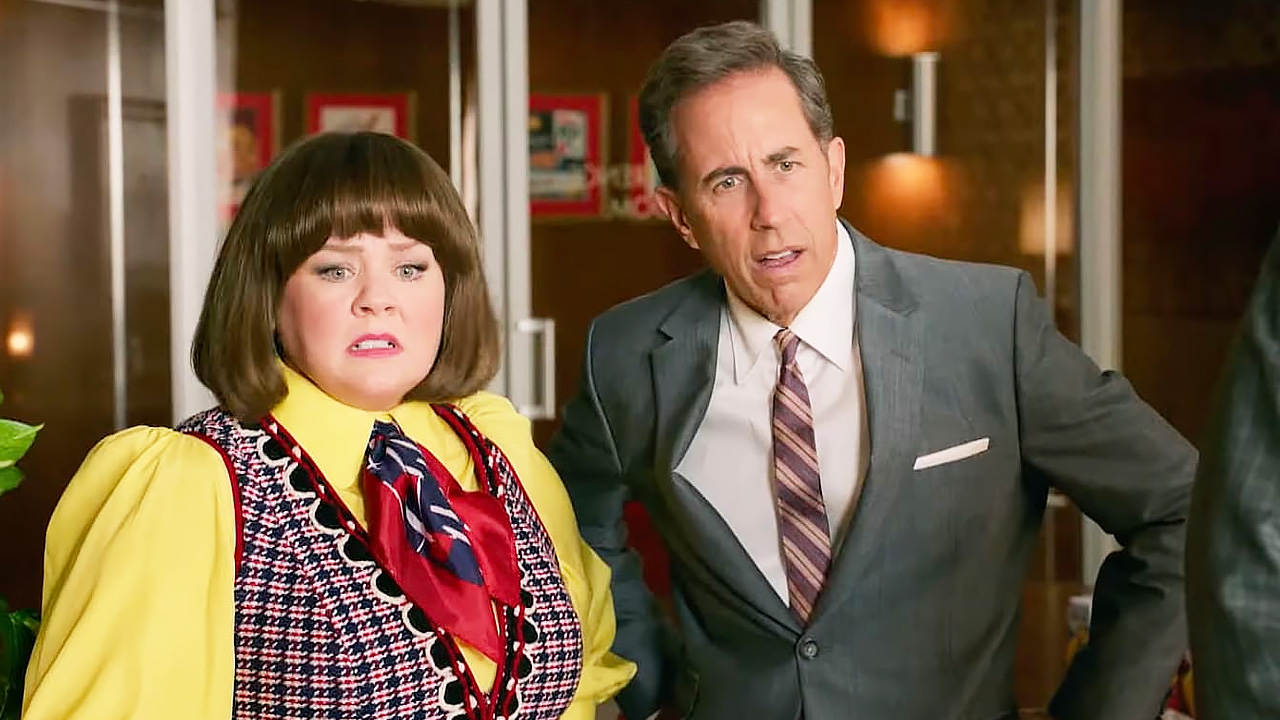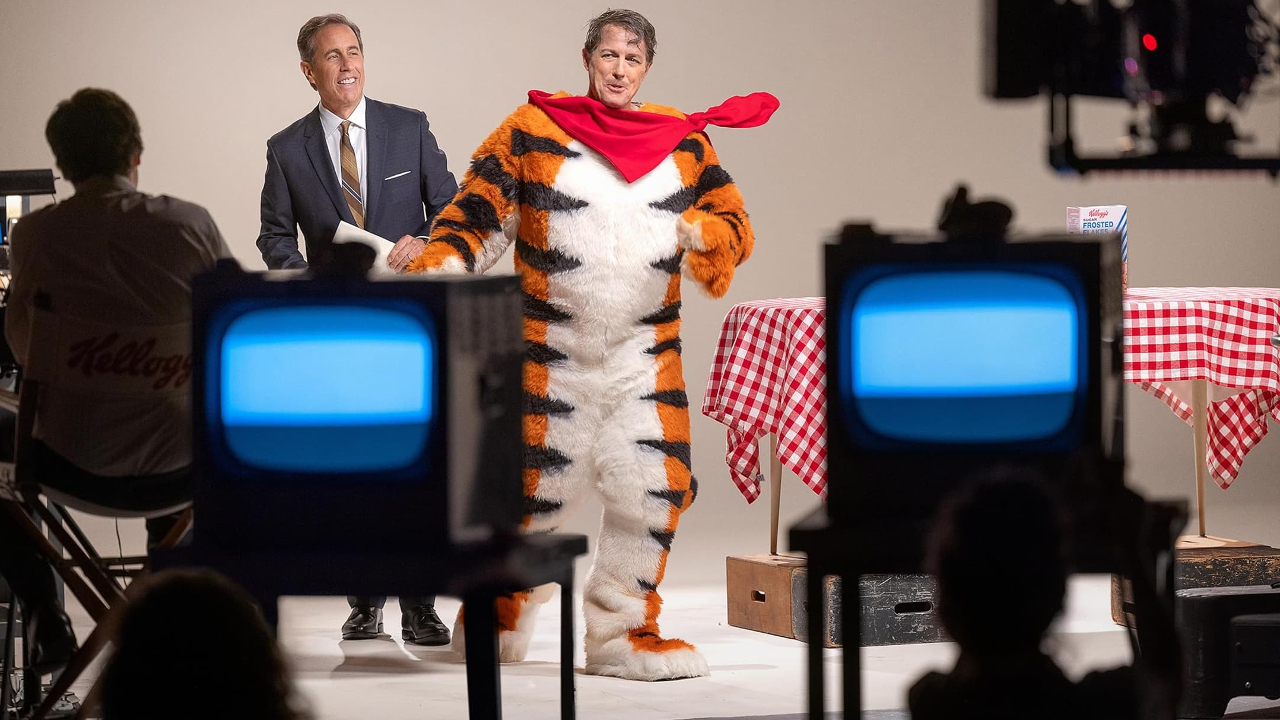Seinfeld’s twee cereal comedy Unfrosted is a joke in itself – but not a funny one

Jerry Seinfeld makes his feature directorial debut with a scattershot Netflix parody of product biopics. Luke Buckmaster barely sniggered at Unfrosted, let alone laughed out loud.
On the PR circuit for his feature film directorial debut, Unfrosted, Jerry Seinfeld lashed out against the pernicious influence of the “extreme left” and their “PC crap,” decrying a current culture that’s “worrying so much about offending other people.” Now we know why: he was preparing us for this furiously bold and incendiary piece of work—a flaming assault of social and political rabble-rousing determined to shake audiences from their wokified worlds.
Except of course the opposite is true, making the arrival of this devotedly inoffensive milk-and-water comedy a tinge surreal. It’s twee as twee can be, revolving around two companies—Kellogg’s and Post—engaged in a war for America’s breakfast market. More specifically it’s about the invention of the Pop-Tart, the narrative dominance of this tasty pastry almost a joke in itself.
Perhaps Seinfeld—who is now 70—is strategically enshrining his image as the clean, all-American man-child, a label that used to perfectly suit him but has become increasingly associated with potty-mouthed slobs à la Adam Sandler, who are more likely to projectile vomit or defecate themselves than peacefully consume a bowl of cereal.
Unfrosted is anchored by a gallingly clichéd and conventional framing device, with barely a hint that Seinfeld might be taking the piss. A young boy enters a diner and reads about the history of Pop-Tarts on the back of a box. Seinfeld’s character Bob—a marketing executive for Kellogg’s—insists on recounting the “real” story, launching into narration that, even by the heavily finessed standards of popular voice-overs, is excessively stilted and unnatural, processed on the Hollywood 101 conveyor belt.
The story jumps back to a Happy Days-ish 1960s, with Bob going about his daily duties—including dealing with his doofus boss (Jim Gaffigan) and managing performers such as Hugh Grant’s Thurl Ravenscroft, a thespian trapped in an animal suit, typecast as Tony the Tiger. Only minutes into the runtime everything begins to feel rather forced, the scripting clearly massaged, sculpted, written and rewritten, drained of life and energy, with lines delivered by the actors in ways that suggest they’ve been rehearsing them for months.
Bob discovers a delicious “fruit-filled pastry dingus…some kind of jelly-ish structure thing” that he believes could sink the business—no cereal could survive against it. The film’s humour is kind of dad-like, staged with unashamed dagginess. Maybe that’s the problem—a lack of shame—in addition to the most obvious one of simply not being very funny. To give you a taste of what to expect: when Bob sips an orange beverage invented by Melissa McCarthy’s NASA scientist, he describes it as having a nice tang, to which she responds says “ooo, that’s a good name.” Get it?! Tang! These kinds of jokes are everywhere in this movie, which is executed with an air of desperation visualised in Seinfeld’s smile-strained face, contorted as if to say: “I’m in on the joke but stuck inside this character.”

Post is headed by Amy Schumer, who’s kind of funny but nobody makes their parts pop: the dialogue, despite being so laboured, just isn’t up to snuff. The limited nature of the premise pushes Seinfeld to look elsewhere for cereal-related comedy, really flogging that horse, turning for instance to a visual gag involving a funeral for a fallen (well, exploded) breakfast comrade. Milk and cereal are poured into the hole containing the man’s coffin, one griever dropping sliced banana into it, the equivalent of throwing dirt on a casket—ashes to ashes, dust to dust, fruit on oats. But will anybody be laughing? Somebody like Mel Brooks might’ve juiced up this moment, gone hard on the absurdity of it, but Seinfeld’s execution is tame and straight-forward; he’s far from a natural in the director’s chair.
Unfrosted is haphazardly plotted, with a chaotic circular momentum—turning, crashing and careening as its writers (Seinfeld, Spike Feresten, Andy Robin and Barry Marder) throw mud to see what sticks. There’s something a little endearing in its sloppiness and cartoony spirit, though I barely sniggered throughout the runtime let alone laughed out loud. The film culminates with a series of outtakes and shots of actors dancing: the perfectly unadventurous curtain closer, reminding us that at least the cast had a good time.
Comedy is very subjective—but I’d be gobsmacked if most audiences considered this anything more than, at best, a pleasantly anarchic lark. For me it was certainly anarchic.


















